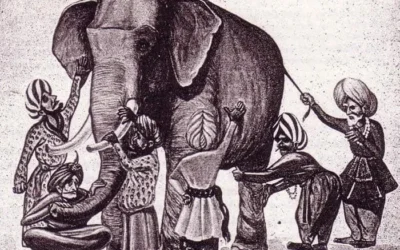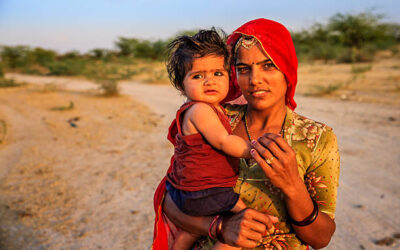“Is experiencing village life one of the reasons you joined the fellowship?”
“What, no haha. I mean, I know a lot of people are looking forward to that. So, no offense, but I grew up in a village, so not really!”, something I said in the first month of the fellowship, in response to the well-meaning question above. Well, turns out, experiencing the villages in Southern Rajasthan has left me with impressions that make me question ‘knowing’ anything about villages earlier.
Here are 10 things which define rural Rajasthan and small towns amidst the lakes and hills of Udaipur for me:
- Being asked your jaat (caste) and other such otherwise unusual prompts by women in Ghoonghat (veil) – “Beta, naam ke aage kya lagate ho? Bas Papa ka naam? Kuch toh lagate honge?”, “Non-veg khate ho?”, “Are you staying at the Prajapat colony, or Brahmapuri?”
When there is caste segregated housing, we cannot worry about being politically correct. Here you will find ‘Bhil’ Bastis and ‘Rathoron’ ka Guda with flashy direction boards. And where there aren’t any such boards and names, people will still choose to say “Yeh Rajputon ka gaon hai, aage us basti mein Aadivasi rehte hai”.
Something common across all housing lanes, of all castes, is the Ghoonghat worn by women. I have noticed them pulling it down as soon as they see their father-in-law from even a mile away. During community meetings, they speak holding it on one side, covering their face just from the men.

- Never ending Jagrans and Vrats (fasts) – Dasshamata, Sheetla Mata, Meldi Mata, there is never a shortage of Gods and Goddesses to worship, to pull all nighters singing and dancing and to observe fasts. There is someone or the other fasting at every team lunch or training. You can expect to hear a lot of “Aapka Vrat nahi hai?” as you take a bite of your meal.
- Who’s cattle is it anyway? – Reaching a village far off means stopping the vehicle at least five times to allow goats and buffaloes to cross the roads. You will often find children carrying baby goats, women running behind a crazy buffalo trying to take control and men sitting under a tree smoking beedis while their cattle go grazing.

- Dhinchak music and baraat – Covid or no Covid, shaadis (weddings) in these villages are loud, quite literally. The baraat is special as you will find the bride sitting on a horse in her lehenga and shyly laughing while peeping through her ghoonghat. The bigger highlight, however, is the DJ/ baraat singer who manages the crowd singlehandedly with one mic and the huge loudspeaker attached to an auto-rickshaw. Any event here calls for some half Mewadi-half Gujrati party music, only remix allowed. These events include gram sabha (village meeting) announcements as well.
- Gullies, hot jalebis and cutting the cake – It took me more than three weeks to remember the way to my own place in Gogunda (a block in Udaipur where I stayed) because that is how many gullies I had to walk through. Two wheelers zooming past from all sides, one cannot take a moment to smell the hot jalebis being made in the corner, because if you do, you might be cutting a cake (a phrase I recently learnt where cow dungs are referred to as cakes, and when you step on one, you cut it)

- Plucking fruits everywhere – Field work on a hot day and long walks to villages without pakka roads are always worth it when you find a tree full of fruits. Timru (a kind of berry), mangoes, guavas, wild berries, and sitafal (custard apple) are just some of the fruits that I have picked from the field. Do not worry, if you do not remember to pick them, there will be a child who will bring it to you 🙂
- Hand pump – Children hanging on to one edge, another child sliding on to the handle, a few women gossiping while filling cans and buckets of water or washing clothes. Always stop by a hand pump to drink water or strike conversations or call people for your meeting.
- Familiarity with NGO culture – With some old organisations operating since almost independence in India, this region has seen too many ‘sansthas’ and ‘sansthawale’. Do not be surprised if someone asks “Kai suchna dene aaye ho?” (What information you’ve come to give now?) when you reach their village. My advice would be to not deny that you’re here to give information, or else the next remark would be, “Accha, survey karne aaye ho! Kya batana hai bolo”. (Oh! Then you’re here to conduct a survey. Ask, what do I tell.)

- Jeeps, buses, triple rides – Reaching field areas often mean waiting for a bus or a jeep for upto an hour because regular timing is hardly followed, for multiple reasons. No driver will deny you a seat even if there are ten people hanging off the vehicle, looking like they can fall at any moment. No one will bat their eye before they speed up and overtake another taxi so that they get more people to hang over their gaadi.
- A place for Chai lovers – Meetings, visits, training, regular office days, all start and end with a cup of chai. “Aap CHAI nahi peete ho?”, is always followed by exclaims which make you regret saying no. It has been a year of me saying no to chai, and I still encounter a series of exclaims and long discussions over whether people from my jaat do not drink tea. Interesting, isn’t it?
What are some of the things that you will always remember about your time in a village?



I will always remember khatti chaas. The whole of Mewar loves it! So much so that almost all the vegetables I can think were cooked in khatti chaas 🙂
Oh yes Katti Chaas!
Amazing , well articulated. We know very little of each other.
I will always remember khatti chaas. The whole of Mewar loves it! So much so that almost all the vegetables I can think were cooked in khatti chaas 🙂
Oh yes Katti Chaas!
Amazing , well articulated. We know very little of each other.
Apka kary udaipur me bahut accha raha ham asha karte he age jindgi me sab kam aacche rahege
Apka kary udaipur me bahut accha raha ham asha karte he age jindgi me sab kam aacche rahege